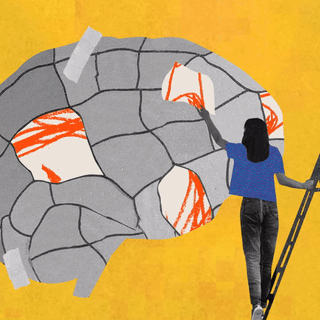A form of gentle, nurturing touch — called “havening” — may have the potential to harness physical contact to help people’s mental health, according to a new study.
Published last month in Psychology and Neuroscience, the study describes havening as a “psycho-sensory therapeutic technique that purportedly harnesses the power of touch to stimulate oxytocin release and facilitate adaptive processing of distressing thoughts [or] memories.” According to its authors, “the current study is the first to investigate [its] effects… on subjective distress, mood, brain function, and wellbeing.” They noted that prior to this, professionals only had anecdotal evidence to rely on.
The present study divided its participants into two groups — one that was exposed to havening, and one that wasn’t. During therapy, the first group was subjected to “gentle sweeping touch[es] to either the[ir] face, upper arms, and shoulders, or palms.” Subsequently, both the groups were asked to self-report any difference between their levels of mental distress before and after the session. In addition, the researchers also measured the electrical activities in their brains using electroencephalography.
The results indicated a greater reduction in distress for the group that was subjected to havening. The brain scan, too, highlighted what the researchers believe to be changes in the brain’s limbic system, which plays a part in people’s behavioral and emotional responses.
Related on The Swaddle:
We’re All Touch‑Deprived Under Lockdown. It Can Affect Our Self‑Perception.
“The idea is that because your brain is unable to process two thoughts at the same time, the soft-touch removes the trauma memory and halts activation of the amygdala — the part of the brain responsible for processing emotions,” Jaime Zuckerman, a clinical psychologist who wasn’t involved in the present study, had explained in 2020.
A few years back, singer Justin Bieber had mentioned implementing havening as part of his mental healthcare under the guidance of his health coach.
In the past, however, some psychologists deemed havening as “pseudoscience unsupported by any meaningful research.” It remains to be seen whether the present study alters their views on the subject — especially since empirical studies are beginning to investigate its benefits only now.
“Hormones and brain chemicals… are released through our bodies with desired social contact… and are critical to our psychological and physical wellbeing, supporting our immune system,” Alexander Sumich, an associate professor of psychology at Nottingham Trent University’s School of Social Sciences, who was the first author of the study, said in a statement. “Oxytocin also helps an area of the limbic system called the amygdala adaptively determine whether we should be fearful of something or not… the ‘havening touch’ accelerates the reduction in distress, with even just a single session,” Sumich added.
Related on The Swaddle:
The Best Way to Hug Someone, According to Science
However, it’s not clear how people who live with haphephobia, or a fear of being touched, respond to havening. For many neurodivergent individuals too — particularly those on the autism spectrum — touch can feel uncomfortable. Experiencing high degrees of social anxiety, too, can make people averse to physical contact — including being touched, and touching others. So, while havening may have the potential to reduce mental distress, it would be important to explore its limitations as well — especially given that touch itself may induce distress for many. Perhaps, that’s something future research on the subject can focus on.
Some practitioners of havening have suggested in the past that one can use the technique on oneself too — that is, people can touch themselves instead of being touched by their mental health professionals. They do, however, point out that even for self-havening, it’s important to work under the guidance of a therapist. Even so, therein might lie a way for touch-averse individuals to reap the benefits of havening without having to engage in physical contact with other human beings.
For now though, “as we emerge from a time of social distancing, it is important to recognize the importance of touch in wellbeing,” Sumich concludes.




